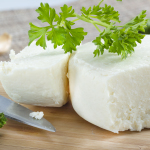Cotija is a Hispa nic-style cheese named after the town of Cotija de la Paz in the Mexican state of Michoacán. This hard, crumbly Mexican cheese is made mainly from cow’s milk
nic-style cheese named after the town of Cotija de la Paz in the Mexican state of Michoacán. This hard, crumbly Mexican cheese is made mainly from cow’s milk
When the cheese is made, it is white, fresh and salty thus bearing immense resemblance to feta cheese. However, with aging it becomes hard and crumbly like Parmigiano-Reggiano. Its similarity with Parmesan has earned it the nickname “Parmesan of Mexico”. The aged version of Cotija is referred to as “anejo”. You may also see it labeled as Queso Anejo
Traditionally, Cotija cheese was made with raw milk aged for three to twelve months. But the commercial productions add an enzyme to speed up the ripening process. This need for acceleration gives the commercial produce a slight change in flavor compared to the artisanal variety.
Since, Cotija cheese is very salty, strongly flavored, firm and does not actually melt, it is used for grating on salads, soups, casseroles, tacos, tostadas and chili. In Mexico, it is also widely used to enhance the flavor of many savory dishes by mixing directly into the casserole or recipe. In the U.S. it is increasingly popular on pasta. It is typically shredded onto cooked foods, also in salads and with fruit.



